George Duncan
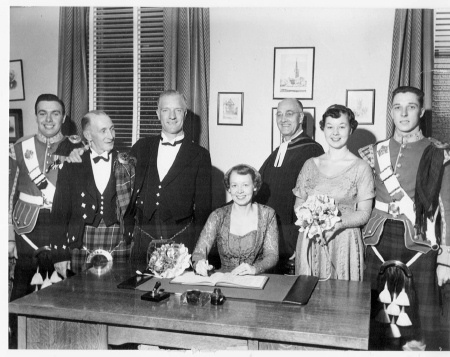
Pictured above is George Duncan, best man at the wedding of John Wilson and Margaret Reid ... both men were very dear to me as a youth. John was my teacher. George was my mentor. George would pass through St. Catharines occasionally on his way to Games. With him many times was one of his prize students Bill Grant. I often wonder what happened to Bill ... But George, originally from Edinburgh, was a stalwart on the teaching and judging scene back in the 50's and 60's ... To this day, I recall George sticking his head into the band circle to better hear the pipes! Try that today ... I still use teaching techniques taught to me by George ... specifically on maintaining a good pressure in the pipe.
Many of the top players of today and the latter part of the 20th century were fortunate enough to call George Duncan their teacher; Gord Tuck, Bill Logan, Chuck Murdoch and many more. George's effect on piping in North America is still being felt as all these players are either now teachers or adjudicators at the highest levels of piping.
Bill Logan, from Banner Elk, NC recently shared the following:
"These are some asides that you might be interested in.
It was George's father who was instrumental in getting Willie Ross to take John D. Burgess as a pupil. This fact was related to me by Burgess himself so I take it as the truth. George was also instrumental in getting Jock Wilson to immigrate to Canada. They were long time friends and both took lessons from Roddy Campbell.
George was also a good friend of D. R MacLennan. D. R. was the half-brother of G.S. having different mothers but the same father. George and D. R. both took lessons from DR's uncle. I believe that his name was Donald also. Because of this friendship with D. R. I was able to take lessons from him when I went over to Scotand as a boy to compete. When George immigrated to the US, New York City, he took piobaireachd lessons from Donald MacPherson. Donald was the brother of Angus MacPherson. Angus remained in Scotland Donald immigrated to the US."
And from Marge Duncan Longphee, we get another glimpse of her father's relationship with Bill Logan:
"Bill Logan also mentioned that he and my father went to Chicago when John Burgess came over and he said my father recorded Burgess on the wire recorder for over two hours. I wonder if Gordon Tuck has that recording. That would be a great addition to your website."
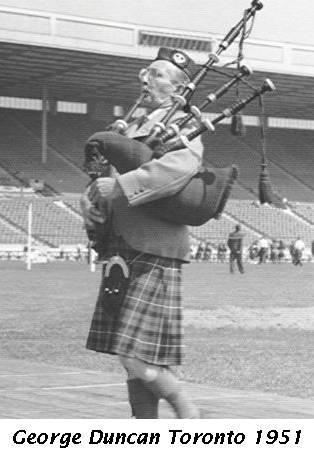
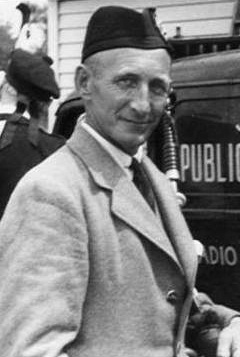
All these photos are courtesy of Marge Longphee, daughter of George and long time married to Angus Longphee, Canada Guards and former L/D with the St. Thomas Police....also with the Chrysler Pipe Band of Detroit.... many years ago !
George Duncan was born in Edinburgh, Scotland in 1902. As a boy, he was taught the pipes by William MacLeod. He became a close friend of D.R. MacLellan, so he was surrounded by the best of music. For finishing, George went to Roddy Campbell from 1917 until his immigration to the United States in 1923.
On arriving in the U.S., George settled in New York City where he played with the Lovat Scouts Pipe Band under Angus Fraser. At this time George associated with some great players - Donald S. MacPherson, Donald Buchanan and Ed Tucker. It was at the World's Fair in 1939 that he met the Ford Band from Detroit. He signed on with the band, moved to Detroit and became a Ford employee until his retirement.
In post-war Detroit, George was to achieve great success as a Pipe Major, solo competitor and teacher. He formed the Detroit Highlanders and with P/S Walter Rose, John Scott, Donald and Sandy MacPhee, Bill Cromarty and Roddy Morrison, they dominated both the band and solo scenes.
As a teacher, many of George's students were destined to become excellent solo players, pipe majors and respected adjudicators. Among these, as mentioned earlier, was Bill Logan who competed successfully at the Cowal Championships in the early 1950's. Another was Chuck Murdoch who was Pipe Major of the highly successful Manchester Pipe Band for nearly 30 years and now heads up the music board of the EUSPBA. Yet another was Tom Hinchey who led the Balmoral Highlanders of Syracuse, NY, went on to play with the Clan MacFarlane Pipe Band and later became an adjudicator in the U.S. and Canada. From Ontario, George taught Bill Ferguson and Gordon S. Tuck. Gord was the best light music player of his day as well as an accomplished fiddler. He was noted for his strong technique, musicality and great sound - traits of all of George's pupils.
Now for some listens of George playing...first up Corrienessan's Salute. Now this was done over 60 years ago, so recording technology was a far cry from today ... styles a little different than mainstream today...perhaps played at a time when pipers played styles and settings to best suit themselves rather than the Gold Medal judges of the day ... something to think about, right ?
 Corrienessan's Salute - George Duncan
Corrienessan's Salute - George Duncan
 The Wee Spree - George Duncan
The Wee Spree - George Duncan
 And now for some
Marches - George Duncan
And now for some
Marches - George Duncan
And now from the Piping Times:
Volume 1, Number 2 November, 1948
AMERICAN PIPER VISIT
Scotland received what was literally a flying visit this summer from Mr. George Duncan, the prominent American piper. Mr. Duncan, with his wife and two daughters, came over at the end of August and stayed for approximately one month, during which time they visited some of the most important gatherings, notably Ban and Inverness.
We were, of course, familiar with Mr. Duncan's ability through the reports of piping contests held across the Atlantic. He is probably the most prolific prizewinner in the States, and as much has been known in name at least to us here, but we have been very glad to have had the opportunity of having confirmation of the undoubted excellence of his playing. Unfortunately, he gave no public performance, in competition or otherwise, and so the great majority have been denied the interest of comparing styles and standards in the two countries.
INTERESTING COMPARISON
It is indeed a pity that Mr. Duncan had not entered and competed at the Argyllshire Gathering and the Northern Meeting. Like Canada's premier piper, Alex. MacNeill, who visited us in 1938, he was content to listen and take notes, and his comments on the playing were extremely interesting and valuable. The advantages of his visit, however, could have been increased greatly in competition, if he had measured the best of American piping against the vigour of our young professional school and the genius of our amateur players.
"FOREIGN STANDARDS"
Many pipers and half-pipers have been inclined to scoff at the standard of piping furth of Scotland, but let there be no mistake, both George Duncan and Alex MacNeill would have won prizes at these classic contests. They could have easily claimed the L1 5s. " ability and expenses" money at Inverness, though, in their cases, it would be a small drop in a large bucket.
Perhaps a shyness unusual in people from the other side prevented them from stepping on the boards, but whatever it was, ours was the loss. We hope Mr. Duncan enjoyed his trip and carries back with him some pleasant memories.
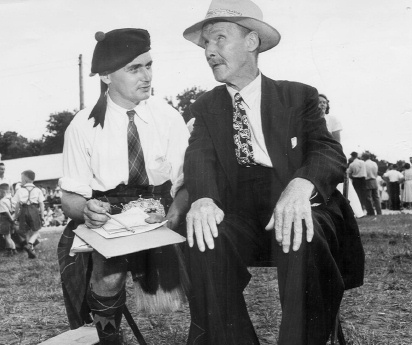
Alex. scribing for his father Archie MacNeill, the blind piper.
And now from the Piping Times,
Volume 18, Number 5 February, 1966
George Duncan, one of the leading competing pipers and judges of the United States, passed away on the 30th of May, 1965, in Detroit, Mich. He is survived by his wife and two daughters.
Born in Edinburgh in 1902, George Duncan began the practice chanter in 1909 with the well known piper and reed maker, William Campbell MacLeod . After a good grounding in piping he joined the Highland Pipers Society, where he became acquainted with such well known pipers as William Ross, J.O.Duff, James Taylor, Roddie Campbell, and John Wilson. George migrated to the United States in 1923, living in New York until 1938, when he moved to Detroit to join the old Ford Pipe Band.
While in active competition, George Duncan won most of the coveted awards at the Eastern United States Games, including the following: The Hendrie Medal for Piobaireachd; The Edinburgh Medal (four times); and, in 1948, entering 28 competitions, he won 26 firsts and 2 seconds.
As a boy he was a friend of Lt. John MacLennan and his sons, Donald (D.R.) and George (G.S.). He played with Donald in the Royal Scots Cadets band before Donald joined the Scots Guards.
George retired from competition in 1956, since which time he has been one of the competent judges of piping in the Eastern United States, appearing at most of the important games. His last touch with piping came when he judged the Toronto Indoor Games in March of 1965. He will be missed by many of the people who knew him, both pipers and non-pipers alike.
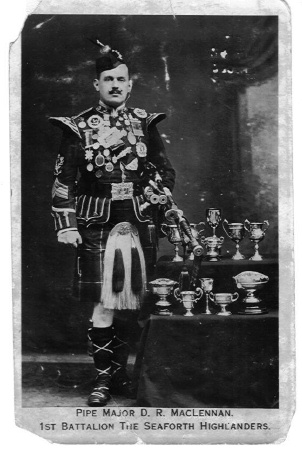
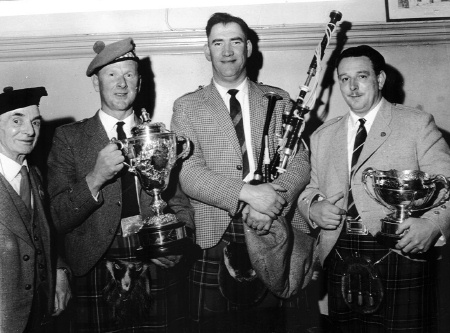
From the Edinburgh Evening News - is that big Ronnie Lawrie ?
and finally
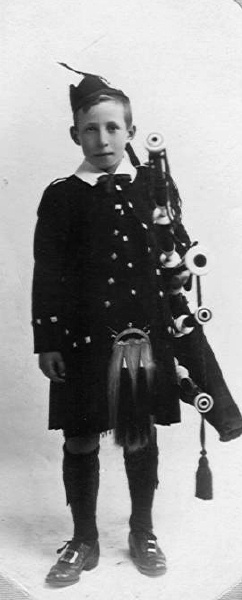

George Duncan - 1911 - age 9 yrs 1902 - 1965
Return to The Captain's Corner Blog